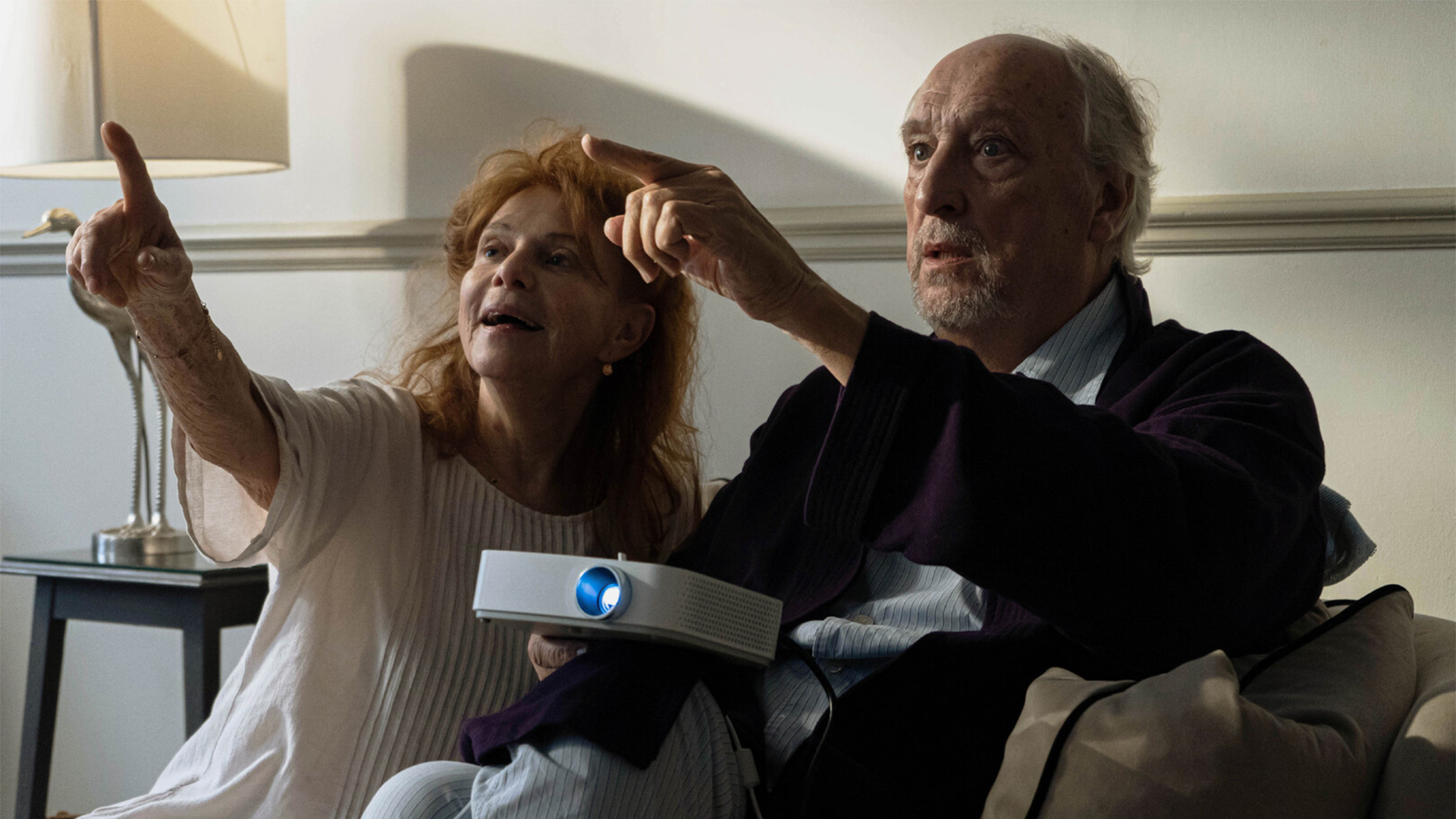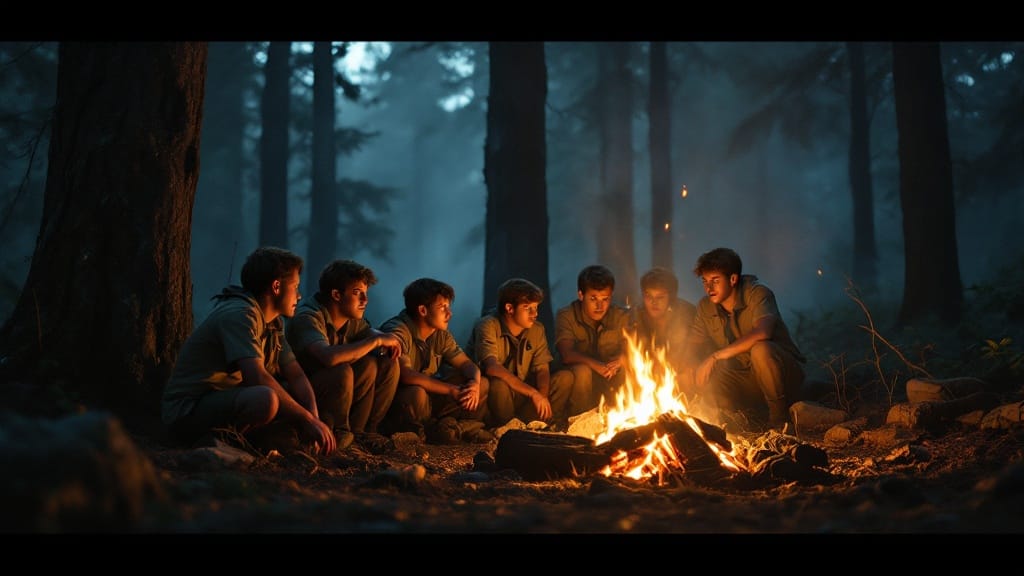Drama
L’Hypermnésique

Directed by Julien Mouquet
Warning, this review may have spoilers
“L’Hypermnésique” is a delicate and emotionally charged short film that explores the power of memories and the lengths people will go to in order to rewrite the past. Julien Mouquet, in his debut independent fiction project, has crafted a story that resonates deeply with audiences by blending tragedy, love, and regret. Gaby (Agathe Natanson Marielle) and Jo (Bernard Farcy) are an elderly couple facing the harsh reality of Jo’s deteriorating memory. With Jo’s mind slowly fading, Gaby, weighed down by the unfulfilled dreams of their youth and a lifetime of childlessness, takes it upon herself to create the life they never had. Each night, she painstakingly sets up their home to reflect an alternate reality—one where they had grandchildren and a full, vibrant family life. What could have been becomes her last gift to Jo, a man now caught between the vanishing fragments of his real memories and the manufactured history that Gaby presents.
Mouquet’s direction focuses on the quiet moments of tenderness and desperation between the couple, effectively highlighting how memories define us. Gaby’s heart-wrenching decision to alter Jo’s memories speaks to the universal human desire to escape regret. As viewers, we’re left questioning the morality of her actions. Is it better to allow someone to live their final days believing in a comforting lie, or should they face the truth, no matter how painful?
This film excels in creating an intimate atmosphere. The lighting, particularly in the evening scenes, evokes the sense of a fading world—a perfect parallel to Jo’s diminishing grasp on reality. There were minor technical issues, such as glitches in sound and editing that briefly disrupted the immersion, especially during the scenes involving the projector. These moments detract slightly from the overall experience but are not enough to diminish the emotional weight of the film. The cinematography beautifully captures the couple’s apartment, filled with fabricated memories, as if these objects themselves carry the heavy burden of Gaby’s guilt and Jo’s longing for a life he never lived. The use of close-ups effectively conveys the subtle emotions that the characters feel but often don’t verbalize.
The emotional depth of the story is where “L’Hypermnésique” really had me hooked. Watching Gaby as she attempts to rewrite their history is profoundly moving. Her guilt over their childlessness and the dreams they never achieved is palpable, and yet, the film never feels overly sentimental. There is a balanced blend of hope and despair as Gaby’s actions, though well-intentioned, seem futile. Jo’s realization that these memories aren’t real becomes a powerful turning point. Rather than clinging to the falsehoods, he chooses to hold on to the memories he still has, however imperfect they may be. The film’s final moments, as Jo passes and Gaby reflects on their shared life, serve as a poignant reminder that the most meaningful memories are not the grand ones, but the simple moments shared between loved ones.
Mouquet’s story is both a meditation on memory and a love letter to those who carry the weight of regret. It asks important questions: How far would we go to protect the ones we love from pain? And, at the end of our lives, what truly matters—the life we wished we had lived or the one we actually lived? The film doesn’t provide easy answers, but it does leave the audience with a deep sense of reflection.
Despite its short runtime, “L’Hypermnésique” manages to address complex themes of love, loss, and the human need for closure. The acting is superb, with Agathe Natanson delivering a particularly nuanced performance as Gaby, a woman who simultaneously embodies strength and vulnerability. Bernard Farcy’s portrayal of Jo is equally compelling, especially as he navigates the disorienting world of fading memories. Their chemistry is palpable, drawing the audience into their shared world of quiet heartbreak and unspoken love.
I connected with the emotional core of this film. Whether it’s the nostalgia for past dreams or the fear of losing someone we love, the themes Mouquet explores are universally relatable. “L’Hypermnésique” is a film that lingers with you long after the credits roll, urging us all to reflect on our own memories—both the ones we cherish and the ones we wish we could change.
Comedy
Troop 458

WARNING! This review contains SPOILERS!
Troop 458, written by Trevor Allen, captures the often daunting, yet transformative, experience of being the new kid in a world full of unknowns. We follow Sidney, an anxious boy thrown into his first Boy Scouts campout, where he faces both the perils of acceptance and the strangeness of his eccentric scout leader. As spooky campfire tales start to weave into reality, Sidney is forced to confront his fears head-on, finding moments of humor, adventure, and unexpected camaraderie along the way.
I like the concept of Troop 458 because it blends coming-of-age themes with a playful sense of adventure, all wrapped in an atmosphere tinged with just the right amount of mystery. Allen’s writing brings to life a cast of memorable characters, especially through Sidney’s journey of growth. The tension between humor and fear feels authentic to the Boy Scouts’ setting, and it captures the real challenges kids face when trying to fit in.
What resonated with me most was the screenplay’s exploration of courage—not just in facing mythical dangers but in embracing who you are, quirks and all. Some aspects could benefit from a clearer focus on character motivations and tighter pacing to keep the momentum strong, particularly during scenes that blur the line between myth and reality.
The dialogue is great in many places, offering humor that feels natural for a group of young scouts. There were moments where I felt the conversations could be a bit sharper or more distinct to heighten the comedic or emotional impact. Character development is a strong suit, with Sidney’s evolution being both relatable and satisfying, but secondary characters could have a bit more depth to elevate the ensemble.
Allen’s Troop 458 is polished, with solid grammar, spelling, and formatting that adhere to professional standards. The structure is clean and makes for an easy read, setting up scenes that are visually compelling.
Troop 458 delivers an enjoyable mix of humor, heart, and a touch of the supernatural, leaving me eager to see how it might come to life on screen.
Drama
Ellie

WARNING! This review contains SPOILERS!
Directed by Marcus Mejia
Ellie is a refreshing experience that pulled me right into the world of a young, shy man navigating a work meeting while secretly yearning for a bit of magic in his everyday life. We’re taken through his imaginative, musical daydream—a beautiful escape from reality that reveals his true desires. I loved how the film peeled back layers of his personality without a single word of dialogue. Instead, the music carried the narrative, and surprisingly, it worked so well.
Marcus Mejia did an excellent job blending dramedy elements to keep the film engaging. The moments of humor and more emotional beats make the film feel well-rounded. Mejia’s choice to swap dialogue for music was a bold move, and it paid off. I could feel the character’s internal struggles and hopes as the music brought out emotions words couldn’t.
The lighting felt intimate, almost like it was giving us a window into the protagonist’s soul, and the cinematography perfectly captured the whimsical tone of his daydreams. I noticed how smoothly the editing transitioned between reality and fantasy, which made the story’s pacing feel just right. The sound design was on point, with every beat of music syncing beautifully with the character’s emotional highs and lows.
I loved when the protagonist’s daydream overlapped with reality, creating this seamless blend that felt so relatable. I admired how it portrayed the quiet, unspoken dreams we all carry. It was a reminder of the power of our inner worlds and how much magic lies just beneath the surface of our everyday lives.
Ellie left a gentle yet lasting impression. It’s a unique, heartfelt short film that shows how creative risks can pay off. Ellie is a memorable journey that’s definitely worth the watch.
Drama
Finding Acceptance

Directed by Andrew DeBennett
WARNING! This review contains spoilers.
Watching “Finding Acceptance” was an experience that brought me back to those anti-bullying films we’d see in school assemblies. The story follows Mary, a new student in a wheelchair, navigating the often-tough world of school friendships. Initially, she faces teasing from her peers but finds a genuine friend in Liz, who even manages to extend kindness to Mary’s bully, Max. The message is straightforward and clear: acceptance and empathy matter.
I could see what the director was aiming for—Andrew DeBennett notes that the film was both a joy to create and a personal project. The heart of the story shines through, with Kaylah Pollock (Mary) and Laney Hansen (Liz) bringing warmth to their roles. Their connection feels genuine, even if the overall story feels a bit too familiar.
Technically, the film could have used some fine-tuning. The sound mix was rough, with the music often drowning out dialogue. The editing also felt choppy, making it harder to stay immersed in the story. The dialogue leaned into clichés—phrases like “loser” felt outdated and took away from the realism. The cinematography, however, was a bright spot, creating a warm, inviting feel that suited the film’s positive message.
I felt like the story could’ve benefited from more depth. The bullying that Mary faces is minimal, making her eventual friendships feel somewhat predictable. For younger audiences, this simplicity might be engaging and easy to digest, but it misses the chance to delve into the more complex aspects of acceptance.
In the end, “Finding Acceptance” delivers a positive, albeit simple, message. While it didn’t connect with me on a deeper level, I can see it being a useful film for educational settings, especially for younger viewers learning about kindness and friendship.










